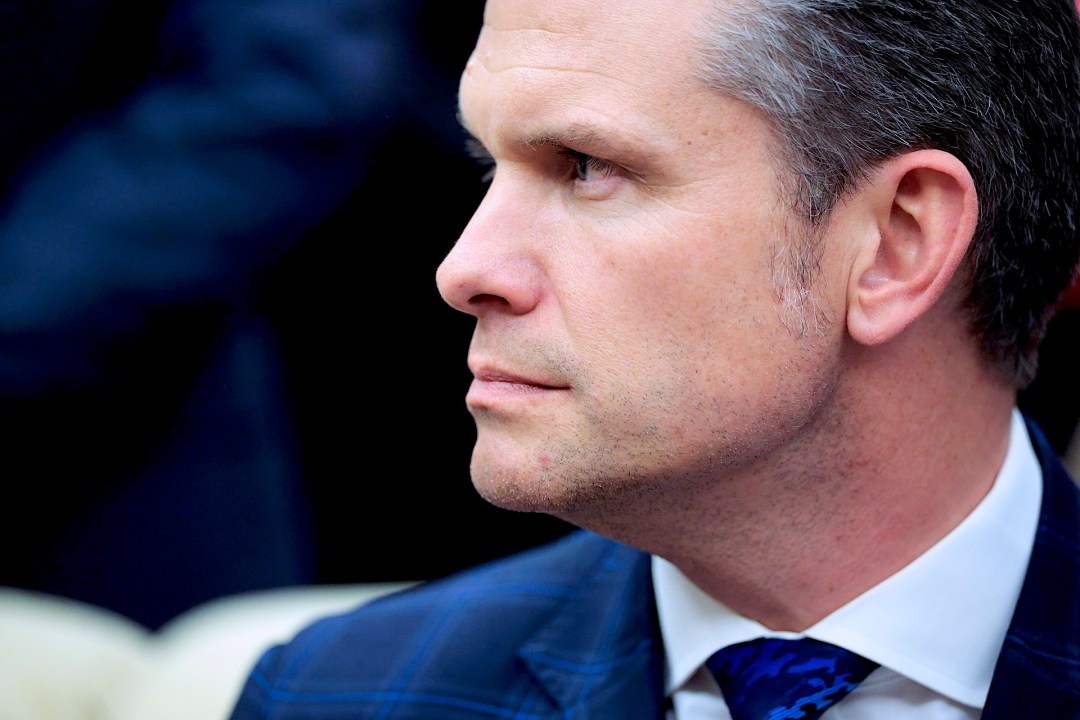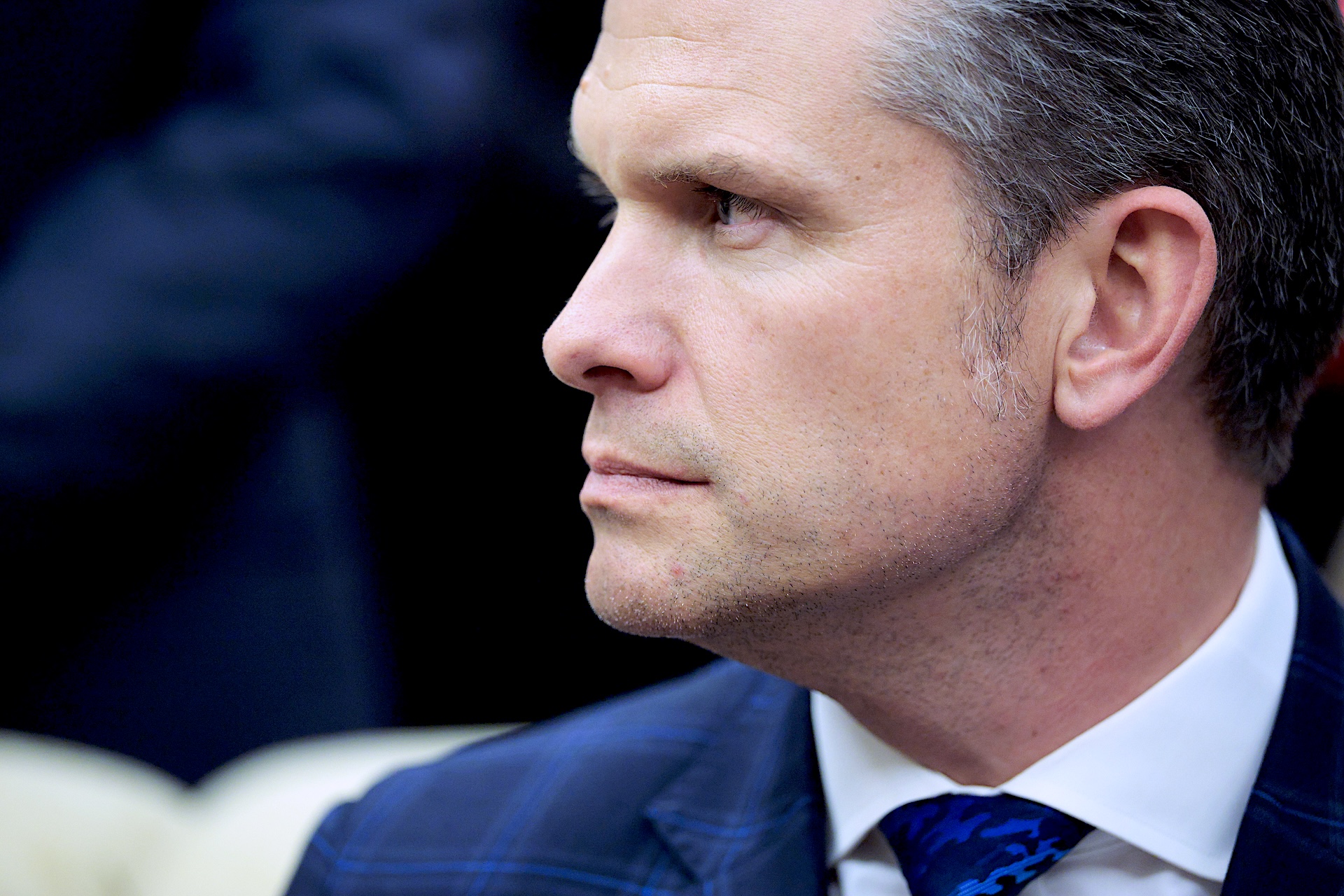The moment the Senate confirmed Pete Hegseth, President Trump’s nomination for defence secretary, the Pentagon community knew it was in trouble.
One horrified defence official said at the time: ‘He may have been educated at Princeton and Harvard, but does he know anything about running a huge organisation like the Pentagon? No, he doesn’t.’
As both Trump and Hegseth have said in recent days, the Pentagon establishment was against this controversial appointment from the beginning and have claimed this is why the defence department is going through its current turmoil, with summary sackings, accusations of intimidation and unauthorised leaks to sympathetic, ‘establishment’ newspapers.
There is a degree of truth in this. Hegseth, aged 45, was not a popular choice. Many people in the Pentagon felt that a former high-profile Fox News presenter, albeit one who had served in Iraq and Afghanistan in the Army National Guard, was neither suited to nor suitable for the immensely powerful and responsible role of American defence secretary.
From Hegseth’s point of view, this perceived systemic discrimination against him is at the heart of the challenges he has faced since he was sworn in on 25 January as the Pentagon boss.
There is more to it, however. The 23,000 people who work at the Pentagon and the roughly 2.7 million who serve in the military in uniform and as civilians in the US and around the globe have been used to steady and capable leadership for as long as they can remember.
Throughout the whole of President Joe Biden’s four-year administration, the Pentagon was in the hands of Lloyd Austin, the former four-star army general with a long career of combat command experience. Austin was a private man who never courted publicity but he hardly put a foot wrong. Only when he sadly needed treatment for prostate cancer and failed to tell anyone, including his commander-in-chief, did he land himself in trouble.
Two of his eminent predecessors, Robert Gates and Leon Panetta, had bagfuls of government experience. Both had previously been director of the CIA before becoming defence secretary. Gates served as defence secretary under both George W. Bush and Barack Obama, and Panetta earlier in his career had been director of the Office of Management and Budget.
Gates and Panetta, both of whom are remembered with affection and loyalty at the Pentagon, were, unquestionably, political heavyweights and had a wealth of big-budget experience. It showed in the way they handled the immense challenges of keeping control of a budget which today is not far off $1 trillion.
Hegseth arrived with a Trump-designed brief which was to turn the Pentagon upside down, to get rid of civil servants not pulling their weight or failing to demonstrate undying loyalty to their new commander-in-chief, and to rid the department of all wokeness, whether it was giving financial help to servicewomen requiring terminations in a state that still allowed abortions to banning transgender personnel from serving in the military and scrapping lower fitness standards for women wanting to apply for combat roles.
Every time he is asked, Hegseth always repeats his favourite mantra which is his abiding determination to convert America’s military into a warrior force capable of winning every war and defeating all enemies from wherever they come. In itself, it wasn’t a bad vision, especially after the debacle of the mass troop-withdrawal from Afghanistan on 30 August 2021 and the gross errors of political judgment made during the counter-insurgency period of the Iraq War.
However, Hegseth soon ran into trouble. There was fierce infighting among his closest advisers and paranoia set in when there were several embarrassing leaks to the newspapers, including military contingency options for ensuring access to the Panama Canal, and a secretly planned visit to the Pentagon by Elon Musk.
Three top advisers, all appointed by Hegseth – Dan Caldwell, Darin Selnick and Colin Carroll – were fired or put on leave, suggesting their boss blamed them for the leaks. Another official, then the chief press spokesman, John Ullyot, had already been ousted, and Joe Kasper, Hegseth’s chief of staff, was also moved on. Five gone in a week.
Rumours and emails spread throughout the building that the hunt for more suspects was on and as a last resort, officials were warned they could be subjected to lie detector tests.
The atmosphere at the Pentagon, with its 17.5 miles of corridors, often filled with employees rushing from one meeting to another, became toxic.
Trump chose Hegseth to be ‘his man’ at the Pentagon
Amid the chaos, Hegseth suddenly found himself at the centre of an extraordinary security breach. It wasn’t his fault, but he played the star role. In the now-infamous Signal WhatsApp text-messaging session between Hegseth and key members of Trump’s national security team, he gave precise details about the upcoming US airstrikes planned against the Houthis in Yemen. Unbeknown to him, one of the group-chat participants was Jeffery Goldberg, editor-in-chief of the Atlantic magazine who had been mistakenly invited.
So, it all became public, although not until after the raids had taken place. Then it was revealed that there was a second Signal group which also benefited from the pre-airstrike plans, and this time the participants included Hegseth’s wife, his brother and personal lawyer.
The second Signal chat was disclosed by the New York Times, underlining for Hegseth that there were officials around him who were out to get him. He vowed on Fox News that those responsible for the leaks could face prosecution. Ironically, Hegseth himself is being investigated by the Pentagon’s inspector-general for giving away operational data on a communications system which, potentially, could be hacked into by American adversaries.
All of which places Hegseth in an unenviable position less than 100 days since the Trump administration began. Will Trump fire him before any further disasters occur?
During his first administration Trump fired top officials on a regular basis. The secretary of state, Rex Tillerson, lasted 423 days. General Jim Mattis, his supposedly treasured defence secretary, resigned after two years in after dealing with a president who made decisions apparently based on instinct and intuition, rather than military advice. Trump maintains he fired Mattis.
Trump chose Hegseth to be ‘his man’ at the Pentagon, rather than a military type with strong leadership skills, and, so far, he has stuck with him, despite calls for his resignation, even among some Republicans.
For the moment, Hegseth will probably survive because he was given a job to do and Trump trusts him to get on with it. From now on Hegseth’s biggest challenge will be to stop the leaks. Any more embarrassing stories could pile on the pressure and, as a result, make the president concerned that the Pentagon is in disarray.








Comments